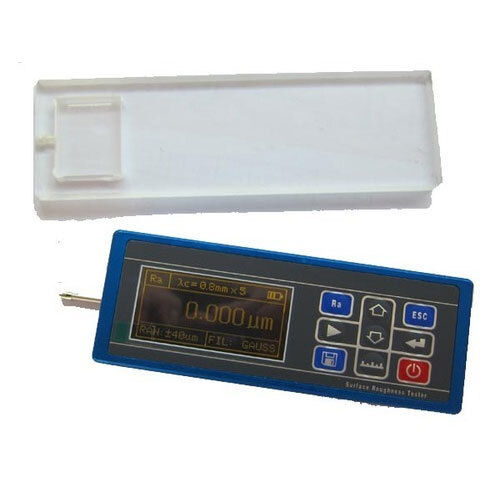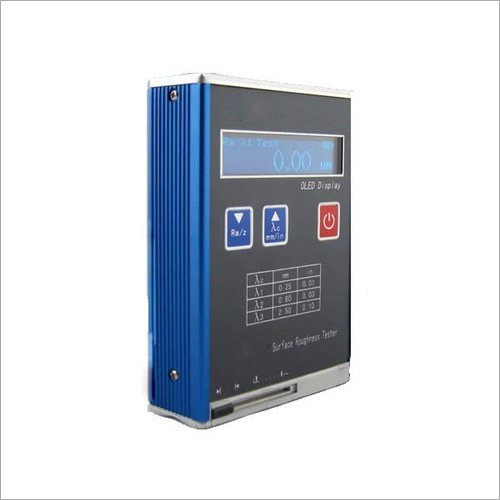Surface Roughness Tester
Product Details:
- Application Laboratory / Industrial Surface Finish Measurement
- Automation Grade Semi-Automatic
- Features Portable, Easy Operation, Rechargeable, High Precision
- Product Type Surface Roughness Tester
- Color Black
- Equipment Type Surface Roughness Tester
- Response Time < 5 seconds
- Click to View more
X
Surface Roughness Tester Price And Quantity
- 1 Piece
Surface Roughness Tester Product Specifications
- Single Measurement
- 10%
- Handheld
- Manual / Automatic
- Ra: 0.05~10m, Rz: 0.1~50m
- Standard specimen or custom
- 6 mm
- Surface Roughness Tester
- < 5 seconds
- Standard USB
- 17.5 mm
- Surface Roughness Tester
- Black
- Laboratory / Industrial Surface Finish Measurement
- Semi-Automatic
- Portable, Easy Operation, Rechargeable, High Precision
- Built-in Rechargeable Battery
- Laboratory
- 0.4 KG (host) Kilograms (kg)
- 143 x 55 x 42 mm (host) Millimeter (mm)
- 1.0 mm/s
- Ra: 0.05~10m, Rz: 0.1~50m
- LCD Digital
- USB
- < 80% RH (non-condensing)
- 42 mm (host dimension)
- 0.4 KG (host)
- 0C 40C
- 0.001m
- 3.7V DC (battery)
Surface Roughness Tester Trade Information
- 7-10 Days
Product Description
A surface roughness tester, also known as a surface profilometer or surface roughness gauge, is a device used to measure the texture or roughness of a surface. These instruments are commonly used in manufacturing, engineering, and quality control processes to ensure that surfaces meet desired specifications and standards.
Surface roughness testers typically work by running a stylus or probe over the surface of the material being measured. As the probe moves, it records deviations in height or texture, providing data on features such as peaks, valleys, and irregularities on the surface. This data is then analyzed to determine various parameters related to surface roughness, such as Ra (average roughness), Rz (maximum height of the profile), Rt (total height variation), and others, depending on the specific measurement standards being used.
Surface roughness testers come in various forms, including portable handheld devices for on-site measurements and larger benchtop models for laboratory use. Some models may also feature digital displays, data storage capabilities, and software for analyzing and interpreting measurement results.
Common industries and applications where surface roughness testers are used include:
1. Manufacturing: Ensuring surface finish quality of machined parts, molds, and components.
2. Automotive: Quality control of engine components, cylinder bores, and other critical surfaces.
3. Aerospace: Inspection of aircraft parts, turbine blades, and other precision components.
4. Metalworking: Evaluation of surface finish after grinding, polishing, or other machining processes.
5. Medical devices: Checking surface finish of implants, prosthetics, and surgical instruments.
Versatile Measurement Capability
The Surface Roughness Tester accommodates diverse applications with its selectable sampling lengths and multiple evaluation units (Ra, Rz, Rq, Rt). It accurately measures a wide range of materials, including metals, plastics, and ceramics, making it ideal for quality control in laboratories and manufacturing environments.
Portable and User-Friendly Design
Designed for handheld use, this instrument features a compact structure and lightweight ABS plastic housing. The easy-to-read LCD digital display, simple controls, and rechargeable battery offer convenience for professionals who require surface analysis on the go or at different workstations.
Efficient Data Handling and Storage
With the ability to store 50 groups of test results, users can efficiently track and manage measurements over time. The standard USB interface supports quick data transfer and the built-in rechargeable battery ensures long operational life between charges, enhancing productivity.
FAQs of Surface Roughness Tester:
Q: How is the Surface Roughness Tester operated and powered?
A: The tester can be operated either manually or automatically, catering to the users specific preference. It is powered by a built-in rechargeable battery with a standard USB port for convenient charging, making it suitable for both laboratory and field use.Q: What materials can I measure with this tester?
A: This surface roughness tester is compatible with metals, plastics, and ceramics, ensuring versatility across various industries such as manufacturing, quality assurance, and research settings.Q: What is the process for conducting a surface finish measurement?
A: Place the testers sensor on the specimen, select your desired sampling length and evaluation unit, and initiate the test using the control interface. The device scans a test width of 17.5 mm at a speed of 1.0 mm/s, delivering precise digital results in under 5 seconds.Q: What are the benefits of using this device for laboratory or industrial applications?
A: Benefits include high accuracy ( 10%), high resolution (0.001m), portability, quick response time, easy operation, and the ability to store up to 50 groups of measurements. Its compatibility with multiple materials further enhances its application range.Q: Where can this surface roughness tester be utilized?
A: This tester is well-suited for laboratory and industrial environments where reliable surface finish analysis is required. Its portable, lightweight design allows for use in different locations, including on-site measurements and quality assurance departments.Q: What are the specifications regarding specimen size and test range?
A: The instrument supports standard or custom specimen sizes, with a measuring range of Ra: 0.0510m and Rz: 0.150m, ensuring flexibility for varying sample requirements.Tell us about your requirement

Price:
Quantity
Select Unit
- 50
- 100
- 200
- 250
- 500
- 1000+
Additional detail
Mobile number
Email
 English
English Spanish
Spanish French
French German
German Italian
Italian Chinese (Simplified)
Chinese (Simplified) Japanese
Japanese Korean
Korean Arabic
Arabic Portuguese
Portuguese



 Call Me Free
Call Me Free
